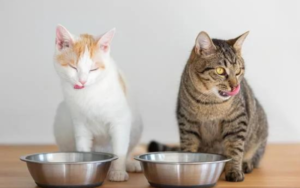Cats are known for being independent creatures, but like all animals, they have specific needs when it comes to food and nutrition. Understanding how long a cat can go without eating is crucial for any pet owner, as it can help you identify when something might be wrong with your feline friend. In this blog post, we’ll explore the factors that influence how long a cat can survive without food, the risks associated with prolonged fasting, and what to do if your cat refuses to eat.

Why Is Your Cat Not Eating?
Before diving into the specifics, it’s important to understand why a cat might stop eating in the first place. There are several reasons why a cat might refuse food, including:
- Illness: A wide range of health issues, such as dental problems, gastrointestinal disorders, or kidney disease, can cause a cat to lose its appetite.
- Stress: Changes in the environment, such as moving to a new home, introducing a new pet, or even a change in routine, can cause stress and lead to a loss of appetite.
- Dietary Preferences: Cats can be picky eaters, and they may refuse food if it’s not to their liking or if they have become accustomed to a certain type of diet.
- Medications: Certain medications can cause a temporary loss of appetite in cats.
How Long Can a Cat Go Without Eating?
Under normal circumstances, a healthy cat can survive for about one to two weeks without food, but this is under extreme conditions and not recommended. However, a cat can only survive without water for about three to four days. It’s crucial to note that even if a cat can technically survive without food for a week or more, this does not mean they should.
After just 24 to 48 hours without food, a cat’s health can begin to deteriorate rapidly. Cats have a unique metabolism, and when they stop eating, they can quickly develop a condition known as hepatic lipidosis, or fatty liver disease. This condition is life-threatening and requires immediate veterinary care.
Factors That Influence How Long a Cat Can Go Without Food
Several factors can influence how long a cat can go without eating:
- Age: Kittens and older cats have weaker immune systems and may suffer more quickly from the effects of not eating.
- Health: Cats with pre-existing health conditions may not be able to survive as long without food.
- Weight: Overweight cats have more fat stores and may survive slightly longer without food, but they are also more prone to developing hepatic lipidosis.
- Activity Level: Active cats burn more calories and require more frequent meals, making it harder for them to go without food for long periods.
What to Do If Your Cat Stops Eating
If your cat refuses to eat for more than 24 hours, it’s important to take action. Here are some steps you can take:
- Consult a Veterinarian: If your cat hasn’t eaten for 24 hours or more, contact your veterinarian immediately. They can conduct tests to determine the underlying cause and provide the necessary treatment.
- Try Different Foods: Offer your cat a variety of foods, including wet food, dry food, or even a small amount of tuna or chicken, to entice them to eat.
- Check for Stressors: Evaluate any recent changes in your cat’s environment that could be causing stress and try to eliminate or reduce these factors.
- Monitor Hydration: Ensure your cat is drinking water. If they’re not drinking, you may need to offer water through a syringe or consult your veterinarian for further advice.
- Use Appetite Stimulants: In some cases, your vet may prescribe appetite stimulants to encourage your cat to eat.
Table: Factors Affecting How Long a Cat Can Go Without Eating
| Factor | Impact on Fasting Duration |
|---|---|
| Age | Younger and older cats are at higher risk. |
| Health | Cats with pre-existing conditions deteriorate faster. |
| Weight | Overweight cats may last longer but risk fatty liver. |
| Activity Level | Active cats require more frequent meals. |
FAQs
A cat should not go without eating for more than 24-48 hours. Prolonged fasting can lead to serious health issues.
If a cat doesn’t eat for more than 24-48 hours, it can develop hepatic lipidosis, a potentially fatal condition.
You can try offering different types of food, reducing stress in the environment, or consulting your vet for appetite stimulants.
Yes, stress is a common reason why cats stop eating. Identifying and eliminating the stressor is crucial.
Yes, a cat can only survive without water for about three to four days, and dehydration can be life-threatening.
Conclusion
Cats are resilient animals, but they require regular food and water to stay healthy. While they can technically survive for a short period without eating, doing so puts them at risk for serious health issues. If your cat stops eating, it’s important to act quickly and seek veterinary advice. By understanding the risks and taking prompt action, you can help ensure your cat remains healthy and happy.
If you have any concerns about your cat’s eating habits or health, don’t hesitate to consult with your veterinarian for the best course of action.



Pingback: How Many Teeth Does a Cat Have? - The Petspective
Pingback: Why Is My Cat Throwing Up Undigested Food? - The Petspective